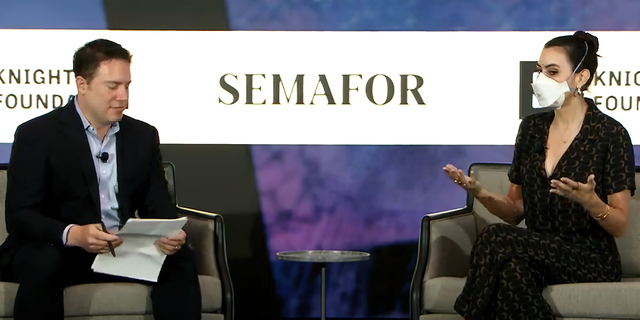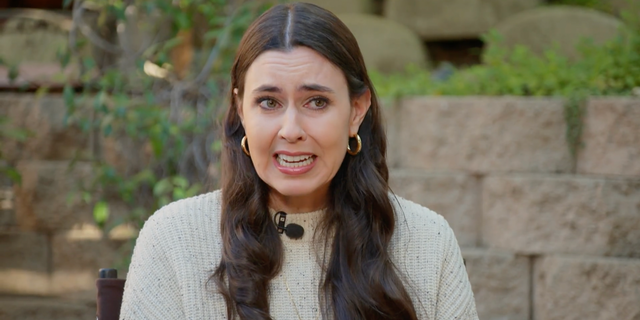NEWYou can now listen to FoxNews articles.
Former New York Times columnist Ben Smith frequently used the term "dishonest" when referring to critics to the controversial Washington Post reporter Taylor Lorenzon Thursday. Faced with why to use it. Before joining the
post, Lorenz, a colleague ofSmith at the Times, attended a pre-launch event for a new media venture, Semafor. While on stage, Smith asked the masked Lorenz why he thought the critics of her were acting "dishonestly."
Lorenz, known for blaming her critics, has used the term 16 times on her Twitter alone since February.
"How do you know who is dishonest? For example, what is my belief? You look at people's hearts and say," This person who disagrees with me, they are angry with me. Because I didn't. I did something wrong. They aren't angry with me because I think I'm too liberal. They're basically dishonest, "Smith said. "What do you say that?"

Washington Post "Signal& Noise: Polarization & Trustin News" event where journalist Taylor Lorenz speaks with Ben Smith at Semafors. (Semafor)
Washington Post is the Taylor Lorenz Report
When Smith simply asked "how," Lorenz first replied, "I can tell the difference between someone who disagrees with you and someone who doesn't act in good faith."
"Based on the nature of their question, yes. For example, if they came to you honestly and said," Hey, I noticed X-Y-Z, "you It's like "Oh". Okay, I'll take your feedback, "Lorenz said. "In every story I write, I hear many different perspectives ... but if someone comes to you and makes a personal attack, they falsely tell you, they Actively participate in a kind of networked harassment ... Retweet people who aren't there For constructive criticism. You can see the difference between constructive and non-constructive criticism. "
Next, Smith suggests that some Lorenz critics may simply be angry or uncomfortable, but may not behave "dishonestly", and the people's intentions are " He accused him of "guessing."
"How do you know? Smith asked.
Lorenz said it was" pretty obvious ", but Smith used it. Before confronting her, I admitted that it was a "some guess" that happened last month when I wrote a column about an online content creator who benefited from the explosive Johnny Depp Amber Heard civil trial. A phrase in the event of a blunder.
In her original report, Lorenz quoted two YouTubers. She benefited from the press of the trial and she said the report did not respond to requests for comment. YouTuber blew up Lorenz, saying she had never contacted them before the story was published.
TAYLOR LORENZ dodges the death threat directed at TIKTOK Week's library after docking Twitter personality

Washington Post columnist Taylor Lorenz said: It broke down during an interview with MSNBC at ab on the moon. Online harassment. (MSNBC)
Following protestfrom a pair of Internet influencers, the false statement first Lorenz Was removed from the report. Thanks. The Washington Post issued two fixes after being called for stealth editing that occurred. The first fix admitted that the characteristics of the communication between Lorenz and YouTuber were inaccurate, and the second fix admitted that the erroneous description was deleted without the editor's note.
Eventually, Lorenz corrects her record, cites "misunderstandings" and blames the editor, while scrutinizing her report is a "dishonest campaign" against her and the Washington Post. Suggested that.
Questions remain as Taylor Lorenz Blames editors, "bad faith campaign" is a false WAPO report
Smith said "the story of the Washington Post was wrong" and said the person who caused the mistake was furious.
Lorenz tried to attack YouTuber. The person says he was involved in a previous scandal.
"Yes, but you made a mistake about them, of course they are angry," Smith said.
"Well, there was an error in the story," Lorenz responded immediately and seemed to blame the story editor again.

Ben Smith regularly with Taylor Lorenz on Thursday Critics who confront about taking on her act dishonestly. ((Photo by Drew Angerer / Getty Images))
Next, Smith told Lorenz, "I'm sorry I failed."
Lorenz claimed that he did exactly that by email, but Smith pointed out that it didn't happen in public.
Lorenz claimed to apologize "until it became very clear that it was very dishonest" and was played on Twitter, so this story is a big deal in the media world. I tried to say that it wasn't.
"I'll let this go soon ... but how can I tell if he's angry in his mind? Bad or good faith?" Smith said. Asked.

Washington Post reporter Taylor Lorenz is regular Has been criticized online. ( (Photo by Eric BARADAT / AFP) (Photo by ERIC BARADAT / AFP via Getty Images) | CNBC TV / YouTube / Screenshot)
"He went to war with the media and said he wanted to destroy the Washington Post," Lorenz replied when he joked that half of the people Smith attended probably felt the same.
"Honestly, that's true," Lorenz replied jokingly before returning to protecting himself.
"I think I'm going back to judgment. We journalists use judgment every day like how we interact with people. What I can do is treat people in good faith. Only. If an error occurs. " "So when you come back, I think it's like a crazy campaign that lasts for days. What you know, you're not there."
Click here to get the FOX News app
Smith almost always sees the term "dishonest" Used to describe the right wing mentioned.
"Mainstream media critics, your critics are certainly on the right," Smith said. "Do you think'bad belief'is primarily a right-wing phenomenon?"
Lorenz said, "Everyone can have bad beliefs." Many of the extreme people fall into that category. Before agreeing to Smith's bigger issue.
"I agree with you." Bad faith "is not the best term, but I couldn't come up with a better term for it," Lorenz said. 206}
Fox News' Joseph A. Wulfsohn contributed to this report.
Brian Flood is a media reporter for FoxNews Digital. Story tips can be sent to brian.flood@fox.com and Twitter: @briansflood.


